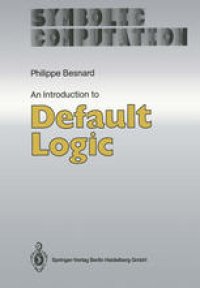
Ebook: An Introduction to Default Logic
Author: Philippe Besnard (auth.)
- Tags: Artificial Intelligence (incl. Robotics), Mathematical Logic and Formal Languages
- Series: Symbolic Computation
- Year: 1989
- Publisher: Springer-Verlag Berlin Heidelberg
- Edition: 1
- Language: English
- pdf
This book is written for those who are interested in a fonnalization of human reasoning, especially in order to build "intelligent" computer systems. Thus, it is mainly designed for the Artificial Intelligence community, both students and researchers, although it can be useful for people working in related fields like cognitive psychology. The major theme is not Artificial Intelligence applications, although these are discussed throughout in sketch fonn. Rather, the book places a heavy emphasis on the fonnal development of default logic, results and problems. Default logic provides a fonnalism for an important part of human reasoning. Default logic is specifically concerned with common sense reasoning, which has recently been recognized in the Artificial Intelligence literature to be of fundamental importance for knowledge representation. Previously, fonnalized reasoning systems failed in real world environments, though succeeding with an acceptable ratio in well-defined environments. This situation enabled empirical explorations and the design of systems without theoretical justification. In particular, they could not be compared since there was no basis to judge their respective merits. Default logic turned out to be very fruitful by proving the correctness of some of them. We hope that this book will initiate other successful developments in default logic.
The purpose of the book is to give a unified and comprehensive account of default logic, the most popular logic for those in the Artificial Intelligence (AI) community interested in the formalization of reasoning with incomplete information. The book is mainly concerned with a systematic presentation of the formal theory of default logic, even though the more informal issue of applications of default logic to Artificial Intelligence in general and Knowledge Representation in particular is extensively dealt with, especially by means of many illustrative examples. The book also contains an overview of the other main logics for reasoning in the absence of complete information about the world. The book is intended to be self-contained, so that it is suitable for beginners. As a textbook it is mainly aimed at graduate students for a course on nonmonotonic reasoning. It is also meant to serve as a reference book for AI workers and for researchers in various fields, e.g. Artificial Intelligence, philosophy and cognitive psychology.
The purpose of the book is to give a unified and comprehensive account of default logic, the most popular logic for those in the Artificial Intelligence (AI) community interested in the formalization of reasoning with incomplete information. The book is mainly concerned with a systematic presentation of the formal theory of default logic, even though the more informal issue of applications of default logic to Artificial Intelligence in general and Knowledge Representation in particular is extensively dealt with, especially by means of many illustrative examples. The book also contains an overview of the other main logics for reasoning in the absence of complete information about the world. The book is intended to be self-contained, so that it is suitable for beginners. As a textbook it is mainly aimed at graduate students for a course on nonmonotonic reasoning. It is also meant to serve as a reference book for AI workers and for researchers in various fields, e.g. Artificial Intelligence, philosophy and cognitive psychology.
Content:
Front Matter....Pages I-XI
Default Reasoning....Pages 1-4
Formal Logic as a Knowledge Representation Scheme....Pages 5-12
First Order Logic....Pages 13-26
Nonmonotonic Extensions for First Order Logic....Pages 27-30
Presentation of Default Logic....Pages 31-36
Formal Development of Default Logic....Pages 37-52
Normal Defaults....Pages 53-74
Further Topics in Default Logic....Pages 75-88
Fragments of Default Logic....Pages 89-100
Problems with Default Logic....Pages 101-110
Default Logic Revisited....Pages 111-130
Circumscription....Pages 131-162
Other Logic Formalizations of Nonmonotonic Reasoning....Pages 163-192
Back Matter....Pages 193-210
The purpose of the book is to give a unified and comprehensive account of default logic, the most popular logic for those in the Artificial Intelligence (AI) community interested in the formalization of reasoning with incomplete information. The book is mainly concerned with a systematic presentation of the formal theory of default logic, even though the more informal issue of applications of default logic to Artificial Intelligence in general and Knowledge Representation in particular is extensively dealt with, especially by means of many illustrative examples. The book also contains an overview of the other main logics for reasoning in the absence of complete information about the world. The book is intended to be self-contained, so that it is suitable for beginners. As a textbook it is mainly aimed at graduate students for a course on nonmonotonic reasoning. It is also meant to serve as a reference book for AI workers and for researchers in various fields, e.g. Artificial Intelligence, philosophy and cognitive psychology.
Content:
Front Matter....Pages I-XI
Default Reasoning....Pages 1-4
Formal Logic as a Knowledge Representation Scheme....Pages 5-12
First Order Logic....Pages 13-26
Nonmonotonic Extensions for First Order Logic....Pages 27-30
Presentation of Default Logic....Pages 31-36
Formal Development of Default Logic....Pages 37-52
Normal Defaults....Pages 53-74
Further Topics in Default Logic....Pages 75-88
Fragments of Default Logic....Pages 89-100
Problems with Default Logic....Pages 101-110
Default Logic Revisited....Pages 111-130
Circumscription....Pages 131-162
Other Logic Formalizations of Nonmonotonic Reasoning....Pages 163-192
Back Matter....Pages 193-210
....